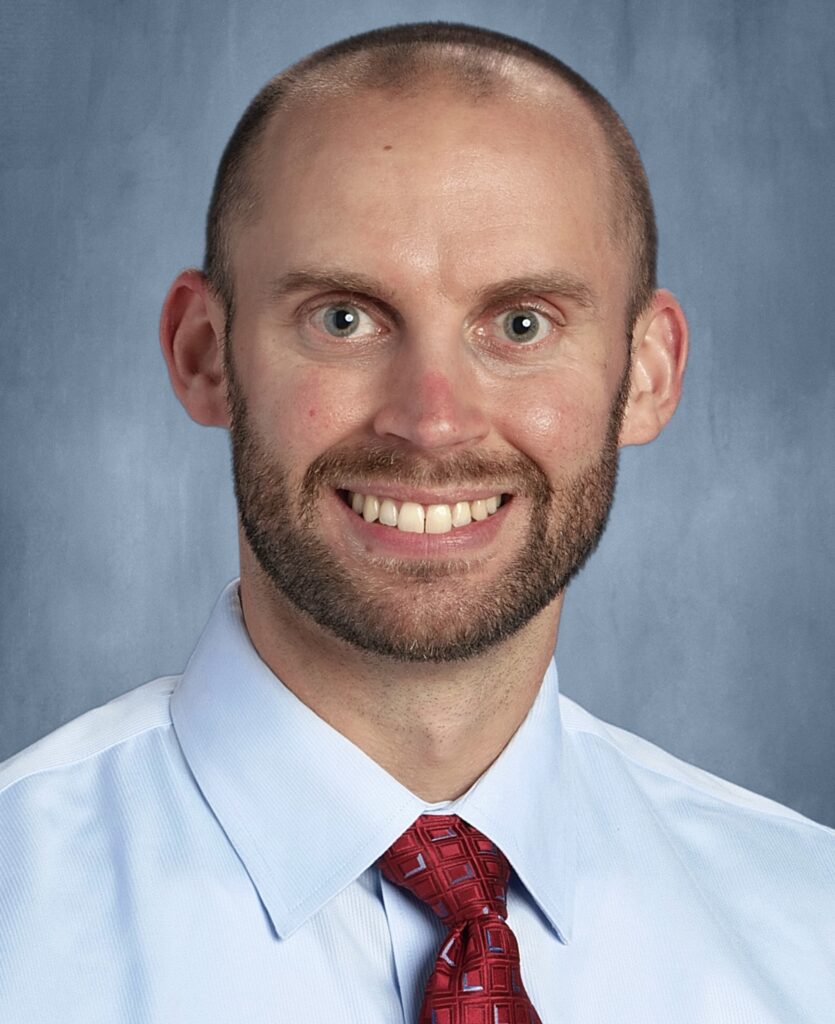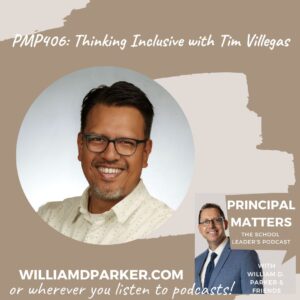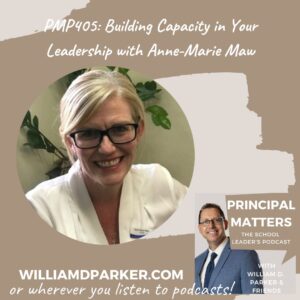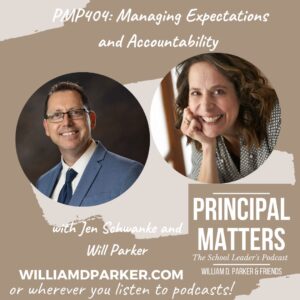Podcast: Play in new window | Download
In today’s episode, Will Parker shares poignant takeaways from a summer hiking trip with his son, Jack, applying those insights to the realm of school leadership. The discussion centers on the importance of being present, connecting with students, and celebrating even the small moments.
Afterward, Will and co-host Jen Schwanke talk about applying those lessons to leadership, including these tips:
- Walk the Land: The idea that you must be deeply involved in your environment to understand it.
- Look Down: Pay attention to the details and small moments that may otherwise go unnoticed.
- Observe the Patterns: Recognize behavioral and emotional trends among students and staff.
Jen’s Perspectives
- Emotional Pulse: What are the ‘feels’ in the school? What emotions seem consistent?
- Observing Loneliness: Are you attentive to students who may be sitting alone or hiding away in common areas?
Jen’s Tip
- A simple smile, a shoulder squeeze, or a high-five can go a long way.
- Hallway Exploration: Do you immerse yourself in crowded hallways during passing periods to discover what’s happening?
Jen’s Insights
- Use this time for informal positive feedback for teachers and to uplift the school atmosphere.
- Listening In: Do you ever pause outside classrooms to appreciate good instruction or enjoy musical performances?
Jen’s Experience
- She used to record sounds from different school environments, like recess or the library, and play them back later to uplift her spirits.
Final Thoughts
These small, often overlooked moments are the building blocks for lasting memories and could serve to ground you throughout the school year. These are also the moments where you can discover or rediscover the best-kept secrets about your school community.
We hope you’ll listen to the entire episode, and we hope this discussion encourages you to be more present and intentional in your role as a school leader, helping you connect with your school community in meaningful ways.
Below is a longer post where Will adds the descriptions and longer version of the story he tells Jen in today’s episode. Thank you again for doing what matters!
Not Missing Out on Your Best Kept Secrets
By William D. Parker, August 18, 2023
This past summer, my son Jack and I headed out to the Panhandle of Oklahoma for some dad-and-son time. For the past couple of years, Jack has been interested in seeing the Black Mesa area where Oklahoma has its highest point of 4,731 feet above sea level. For those familiar with the prairie, you will not be surprised to know that the drive across Oklahoma’s most western lands includes a lot of open sky and open lands. From the highway, you can sometimes see thirty or forty miles in either direction, wide expanses of grass bordered by barbed wire fences.
Further west, however, you discover some hidden gems: the Alabaster caverns near Woodward; the Gloss Mountains with gypsum that reflects like glass off red buttes; and then the surprise of the Black Mesa Prairie Reserve. With more than 1,700 acres, you can enjoy a 4-mile hike to Oklahoma’s highest point. If you walk another 1,200 feet to the western edge of the summit, you’re met by a panoramic view of a long, green valley.
Jack and I sat on long slabs of black rock and ate lunch. The view below stretched for miles – a sea of green dotted by bushes, cedars, and ribboned with dusty field roads. Boundaries were lined with long barbed wire fences. Herds of cattle grazed from such a far distance, they looked like ants crawling on a green canvas. The sky above was brilliant blue, and the wind was gusting so furiously that we had to sit on our hats. Eventually, we found some small spaces in the craggy rocks to lay down for a few minutes to escape the wind and savor an after-lunch rest before the hike back.
As we encountered surprises with each step of our adventure, I was reminded how often our assumptions were proven wrong. How many times do we have pre-conceived ideas of what a new situation may have in store? Perhaps we set our expectations too high, or perhaps they are not high enough.
A few months ago, I was listening to Rick Steve’s travel podcast with guest Robert Reid, who writes about his love for the flatlands. One of his tips encouraged travelers to stop judging landscapes by drive-bys and fly-overs. His suggestions: walk the land, look down, and observe the intricate patterns around you that require careful observation.
I’m not sure what time of the year you are in, but for educators, I’m writing these thoughts at the beginning of a new school year for students in the U.S. Most of us have assumptions about the school year that are well founded. We know the average school year will consist of approximately 190 days of staff and student presence in our buildings. We know the seasons will mark start and end times for each term. We know that spring will bring announcements of retirements, resignations, and job postings. We anticipate in advance our need to reserve space and invitations for end-of-the-school-year ceremonies. How might we keep a traveler’s perspective as we walk this year’s journey?
Walk the Land
This may seem obvious, but I like to remind educators, especially leaders, to step away from their own space and walk your school. Poking your head into classrooms, checking on early-morning programs or practices, giving hello’s to bus drivers or cafeteria workers — these small moments tell you a lot about the emotions of the day.
When you listen in to conversations or take a few minutes to read the lesson objectives listed on a classroom wall, you are beginning to see the world of your school from the perspective of students again. The familiar suddenly becomes charged with new expectations and awareness.
My admin team and I used to share a common commitment to walk the school between every passing period. Often, we would stop by each other’s offices to say, “Let’s walk together,” as a way to stay accountable to see every student, every teacher, every day.
Look Down
Students notice the small things. They know what their teachers are wearing. They can tell you brands of shoes, backpacks, earbuds, and phones with just a glance. As educators, we justifiably fixate on learning outcomes, lesson plans, and student behavior. Just as important, however, are the human interactions we have with the people right in front of us.
By ‘looking down’ you are allowing yourself to be in the moment. One habit I practice is not allowing my phone to distract me from people. When you are constantly reading texts or emails, it is easy to be absorbed in those messages. As a result, when someone asks me a question, I make a commitment to put my technology aside and purposely give them 60 seconds of undivided attention.
Yes, educators need to keep a bird’s eye view of what happening, plan ahead, and think big-picture. At the same time, we also need to be physically and emotionally present for the people we are serving. Don’t allow your strategic thinking to cloud opportunities to capture the learning moments right in front of you.
Observe the Patterns
When I shared with my son Jack the idea of observing the patterns you see when walking trails, I noticed he seemed more quiet and absorbed on our outings. But then, he surprised me by drawing my attention to four different species of cacti he had been observing as we walked.
In our school journeys, you will find that the more you study the small moments, the more clearly you recognize the patterns of learning and behavior. For instance, educators may notice that conflicts among students and even teachers seem to increase after mid-day, especially after lunchtime.
In Dan Pink’s book, When: The Scientific Secrets of Perfect Timing, he explains this phenomenon as the “trough” time of each day – afternoons are often the most difficult because of strains on concentration, decision-making, and low energy. Just recognizing this pattern may help you step into your afternoons with awareness or perhaps a stronger commitment to patience and grace.
Let’s Wrap This Up
Another surprise from my hike with Jack was the sound of incessantly singing crickets and songbirds. Imagine the chorus of nighttime insects transported into a daytime setting of prairie grasses with birds flitting from cactus to cedar branches, and grasshoppers leaping across your pathway of flowing grasses and yuka plants. At one point, we paused to watch the wind whip across the grasses – the stems appearing like golden threads, the heads like small wheat shimmering in the sunlight, yellow dots of light on each stem and head creating millions of dancing, rhythmic surges of undulating waves.
Moments like these might go unnoticed if we had not taken time to simply walk the land, look down, and observe the patterns. The same goes for our schools. How are we taking time to anticipate the unexplored, unexpected, and often ignored parts of our school experiences?
When you are watching a room full of students in a common area or before school begins? How are you searching for someone who sits alone or tries to hide away?
Are you stepping into the middle of a hallway jammed with bodies during a passing period just to see what you may discover?
Are you pausing outside another classroom to catch the voices of good instruction or be swept away by the chorus of singing voices or band instruments?
These are the small moments of a school day that build memories and may keep you grounded throughout the journey of a school year. These are the moments that may help you discover (or rediscover) your best-kept secrets.
Now It’s Your Turn
What is one action you can take today to commit to being in the moment? See what would happen if you give 60 seconds of undivided attention to those asking for your feedback. Make a short list of what you observe the next time you walk through your school, and then share those observations with someone else.
Three Leadership Takeaways from Dr. Nick Davies

Principal Matters is proud to include contributing posts from Dr. Nick Davies, an elementary associate principal for Vancouver Public Schools. He is a Principal Matters Associate and posts his own weekly podcast version of the following content at “Monday Mornings with Dr. Nick” which can be found at https://www.linkedin.com/in/nick-davies-education/
Be a Dream Maker for Kids
Dr. Cynthia Clauson has held just about every role there is in education, including being a superintendent while in her 30s! She is known as an excellent mentor, which is how we were connected. I met with Ted Howard previously, who connected the two of us. Dr. Clauson had some great perspectives and reflections across her varied career in education. We had a long conversation that covered a lot of ground, but here are the three main takeaways from that conversation.
Your Family Cannot Be Second Fiddle
Throughout the conversation, Dr. Clauson kept coming back to her family. It was clear how important that part of her life was to her. As she has progressed in her career, she talked about how she has improved with supporting families so they can better support their kids. This is the same for her own family. She took her first superintendent job when she was 34 in Washington State. The stress and challenges for her young family were a lot. She talked about having the courage to notice those challenges, which led her to step down from the superintendency. Your job needs to be a happy place for your family, and the focus cannot be solely on what you provide to the district you are working in. There needs to be some give and take. She said that as a leader, you will always be limited by the imbalances in your own life, so you need to be aware of what your imbalances are.
Listen and Learn
Dr. Clauson spent a lot of time talking about the need to be constantly learning, which involves intentionally listening to the people around you. She specifically brought up listening to your community as a school leader and learning what their needs are. What can you do to make things better for them? What are the things that you are not going to be able to help with? As you listen as a leader, then you also need to be the lead learner wherever you are. If you have identified concerns in your community but you aren’t able to help them with that problem, then who do you need to bring in so you can eventually help? Dr. Clauson told me that she used Stephen Covey’s 7 Habits of Highly Effective People to help her constantly learn and grow as a leader. Lastly, because she is proactive (one of the 7 Habits), Dr. Clauson looks for processes that are needed before a crisis ever comes up. This means that she looks for people who have done similar things and then partners with and learns from them.
Be a Dream Maker for Kids
I loved this phrase by Dr. Clauson. I asked her what still drives her after a long career and education and she told me ‘Be a dream maker for kids!’ This is a challenge for all of us in schools, and we cannot go it alone. It takes a village as the saying goes. Dr. Clauson said we need to focus on helping students find their passion, talent, and interest. All of our students have gifts, so maximizing their gifts should be a priority of ours. How can we find opportunities in our own schools and communities that will make this a reality? From a superintendent’s perspective, she talked about how putting money towards programs that let students demonstrate their gifts is one of the best ways to demonstrate your commitment to that cause.
I asked Dr. Clauson for a book recommendation, and she loves to read. She told me to read about resilience, mindset, and staying balanced, and then gave me some titles of books that were already on her desk. Here are a couple of them:
- Powerless to Powerful by Suzann Girtz, Joanie Eppinga, and Charles Salina
- The Governance Core by Davis Campbell and Michael Fullen
- The Book of Joy by the Dalai Lama, Desmond Tutu, and Douglas Abrams
Dr. Clauson’s book, Revealing Resilient Leadership, is coming out any day now! Thank you, Dr. Clauson, for your time and advice!


